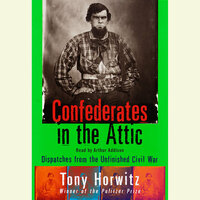Take a photo of a barcode or cover
3.5 stars. Horwitz was a really engaging writer and this is a great travelogue, but his failure to treat seriously with race and the Civil War makes this book really lacking. I don't know if it's because historical memory of the Civil War was so different in the 90s or what, but the fact that Horwitz only glancingly engages with race is glaring to any 2022 reader. Even when he meets with neo-Confederates and people who openly tell him they are racist, he has little to say about the subject and never really unpacks it, even when handed giftwrapped opportunities.
I'd be interested in a thematic response from today that undergoes the same project Horwitz did but with the much more loaded context of today, where acknowledging race and history is forbidden in schools due to panics about "CRT," where the nation is in the middle of a reckoning over policing and its origins in slave patrols, and where a third of the country is dedicated to revanchist racism, even at their own expense. And especially now, when the fight for individual and bodily autonomy is raging once more.
I'd be interested in a thematic response from today that undergoes the same project Horwitz did but with the much more loaded context of today, where acknowledging race and history is forbidden in schools due to panics about "CRT," where the nation is in the middle of a reckoning over policing and its origins in slave patrols, and where a third of the country is dedicated to revanchist racism, even at their own expense. And especially now, when the fight for individual and bodily autonomy is raging once more.
dark
funny
informative
reflective
A couple of thoughts on this book. As someone who grew up in the North and has lived in the South for the past 25 years, I feel I can certainly relate to its Yankee author and his quest to relive Southern Civil War history in more modern times. And I really appreciate Horwitz' impartiality as we see both respect for the South and North sprinkled throughout his narrative. Horwitz is both entertaining and insightful and we readers, especially those living in the South, learn much about our history and ourselves when reading his prose. But I do sort of wonder how true Northerners feel about the book (bored?) and I also feel the book begs for an update 15 years later. I personally believe a lot has happened to the South in the last 15 years and do sort of question whether many of the folks Horwitz encountered in the mid 1990s feel the same way today that they did back then. But a very enjoyable book.
This book elicited a lot of different emotions; it was hilarious, infuriating, poignant, maddening, morbid, gross, fascinating, informative, and just plain sad. Of course it helps to be a bit of a Civil War freak, which I became at age twelve after reading Gone with the Wind (which gets a chapter...scary to learn that many people come to Atlanta to visit the graves of Scarlett and Rhett !)
(one caveat...the chapter "Dying for Dixie" is about a present day murder trial, and was sort of a sore thumb, I thought. I found it rather unpleasant and it threatened to bog me down, glad I finally just let myself skip the rest of it)
(one caveat...the chapter "Dying for Dixie" is about a present day murder trial, and was sort of a sore thumb, I thought. I found it rather unpleasant and it threatened to bog me down, glad I finally just let myself skip the rest of it)
I found this book fascinating and extremely thought provoking. Horwitz spent a year or so in the mid-1990's traveling through a number of southern states from Virginia to Mississippi and talking to countless people about their feelings on the Civil War, race relations, and more. When I first began reading this, I had some reservations about how relevant the material was, due to the fact that it was published over twenty years ago. However, due to recent events, it seems quite possible that little has changed over the last 20+ years. Horwitz talks to a great variety of people and treats them and their opinions respectfully. His writing style is never dull historical material but rather attempts to deduce why after so long the fascination with the War Between the States is still so high. Engaging reading and still quite relevant, as it touches heavily on race relations, antigovernment sentiment, and feelings over the Confederate flag. I will be thinking about this for a long time.
Fabulous book about race, the civil war, and the south.
This is a brilliantly written, poignant exploration of the threads of Lost Cause devotion in the 1990s South. Tony Horowitz has a truly delightful way of coining a phrase. I took my time with this detail-rich, nuanced narrative history, but I'm so glad I read it. Highly recommended.
A little long but fun to read. The chapters and scenes on Robert Lee Hodge and the other “hardcore” re-enactors were the best and most entertaining, and where Horowitz was most immersed in his subject. The homo eroticism of the Hodge crew and contrarian viewpoints were genuinely interesting profiles. There is also some compelling sections like the interview with Shelby Foote, the coverage of a contemporaneous racially charged killing and debate in small town Kentucky over the Rebel mascot, and interesting coverage of Richmond’s town hall on where and how to include an Ashe memorial.
I usually enjoyed descriptions of conversations with locals and museum visits but found the wondering of the battlefields a little dull. Somehow reading this made me a little more open minded to people’s opinions on lost cause nostalgia. Before I had completely dismissed it as silly and hurtful, but I at least follow the emotional and psychological logic of it while still finding it offensive. It also ties some of the emotions of rural and anti-government outrage into the lost cause ideology well.
Not the best narrative travel journalism I’ve read, but an interesting subject that was probably covered as well as possible. Some of it may be a little dated, but it doesn’t seem like main viewpoints on the subject have changed much in the 20+ years.
I usually enjoyed descriptions of conversations with locals and museum visits but found the wondering of the battlefields a little dull. Somehow reading this made me a little more open minded to people’s opinions on lost cause nostalgia. Before I had completely dismissed it as silly and hurtful, but I at least follow the emotional and psychological logic of it while still finding it offensive. It also ties some of the emotions of rural and anti-government outrage into the lost cause ideology well.
Not the best narrative travel journalism I’ve read, but an interesting subject that was probably covered as well as possible. Some of it may be a little dated, but it doesn’t seem like main viewpoints on the subject have changed much in the 20+ years.
Fascinating, entertaining, important. I've been meaning to read this for at least a decade, but if I'd read it earlier I wouldn't have seen all the foreshadowing of Tea Party politics as clearly. In his interviews, he was empathetic and fair with everyone he talked to, and in his reflections, he thought deeply about why the Civil War has such a hold o his imagination and about how its legacy affects this country so many years later.



